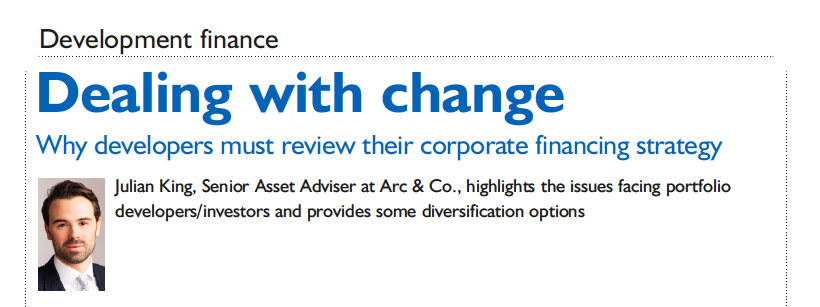THE FULL ARTICLE
During periods of uncertainty, developers will need to review and potentially alter their overall strategy – especially when it comes to their financial structures.
We feel that it is more important than ever to ensure strong and sustainable relationships are built between developers and lenders for now and the months to come.
This comes down to communication between the developer and their current or prospective development lender.
Communicating with the current development lender
We encourage developers to speak to their current lenders in relation to the following situations arising from the Covid-19 pandemic.
Interest and cost overruns
o Interest and cost overruns are an unlimited guarantee for a loan as opposed to a limited PG guarantee - therefore meaning there is no limit on how much cost could be inflicted should the scheme overrun;
o Currently, it is probable that there will be delays in completing development schemes. This might affect the cost of the loan; therefore it is advisable to negotiate an extension of the loan with your lender. This avoids potential added cost via interest and cost overruns, should your loan have this guarantee;
o Some lenders have addressed this already, by giving an automatic 6-month extension to the loan term for developers. Examples we have seen in the market are lenders contacting the client directly to make them aware that they have automatically extended the facility. Even though this breeches the original agreement, the lender has taken precautions to protect the profit involved within a scheme.
If a developer is approaching practical complication with a strategy to build and sell
o Due to changes arising from Covid-19, a developer may wish to alter their current strategy for a scheme that is due to PC. In current market conditions, the market for moving and buying is slowing;
o Social distancing has created certain obstacles, such as removal companies being unavailable. Also, the uncertainty of unemployment is resulting in people not wanting to commit to moving home - especially those who have been furloughed;
o Firstly, talk to your lender about extending the loan, which would give you as the developer more time for the sale period. This is the most efficient way of extending your strategy;
o You may also want to reconsider your strategy for the sale. Consider introducing the idea of a build-to-hold strategy, in addition to a build-to-sell strategy. The build-to-hold strategy would see a developer retain part of the development on a medium or longer-term facility such as a development exit bridge loan for 12 months, or perhaps a buy-to-let facility for 2-5 years;
o The strategy could also be to continue advertising part of the development for sale, giving the developer immediate funds in order to reduce their debt exposure. And then refinancing the scheme onto either a bridge or longer-term facility, thus creating passive income in addition to sales. Providing the current development lender grants permission to proceed with this strategy, the benefits are also beneficial for the long-term, as it will expand the developer’s lender relationships through a scheme for both the now and the future;
o The developer could potentially utilise all three of the exit strategies mentioned; short term – immediate sales, medium-term – bridge facility, and long-term – buy-to-let or a term facility for circa 5 years. By doing this, the developer would be protecting their profit margin and spreading their sales risk; protecting the maximum value of the property and thereafter its return on investment.
Creating new relationships with lenders
We encourage developers to consider the following options when approaching a new development facility during the Covid-19 pandemic.
On demand or committed development facility?
o When approaching a new development facility, especially in current times, it would be wise to ask your prospective lender if the funds are on demand or committed;
o If the facility is on demand, the lender can recall the funds at any point. Of course, if they are committed, you have the security that the funds will be honoured;
o Committed funds can be more expensive, however in our opinion, choosing a lender with committed funds in the current climate would make the most sense. Having the security of funds in uncertain times even with a slight increase in expense, is a small price to pay for being in control;
o In short, with a facility offering committed funds, the developer is in control. With on demands funds, the developer is not.
Reliability
o Having a reliable lender to work with creates security over the scheme. Knowing that the lender has the ability to deliver the funds required - not just at the outset, but throughout the course of the scheme, is pivotal to a developer’s return on investment;
o Having a lender who you can develop a personal relationship with is a good strategy in order to make good decisions on time. How approachable is the lender that you deal with? How much control does that individual have in order to deliver your requests promptly? Human interaction in a volatile market is critical to making quick decisions on time. Simply put, a lender that has too many layers in their company to approve your requests, can lead to delays;
o In addition, work with a lender who doesn’t just deliver the funds on time, but a lender who understands the development process and can work with the client throughout the course of the scheme. An example being, having a good quality project monitoring surveyor so that what is planned is delivered on time to prevent any lapse in time.
What do Lenders look for in developers?
o In the current climate, these key points are more important than ever when acquiring a new development facility;
o Whilst the scheme itself is important, lenders will focus on assessing the developer’s ability to deliver -which is reflected in their past history of delivering similar schemes. This involves analysing the developer’s previous experience to prove that they can achieve what is outlined;
o The lender will also want to understand the make-up of the developer’s wider team such as the contractors, architects etc, who will contribute to the delivery of the development. In addition, some lenders may wish to look further into the wider team for assurance. For example, understanding the contractor’s financial stability. If the contractor is facing financial difficulty, they could be unable to perform during the course of the development.
Summary
The key point to major on is – communication.
In difficult times, communicating with your current lender, as well as your finance advisor regarding prospective new lenders is key. Make sure that the points we have covered: interest and cost overruns and on-demand or committed facilities are considered in tandem with finding a reliable lender with whom you pursue a sustainable relationship. All of this is key in an unpredictable market.

























